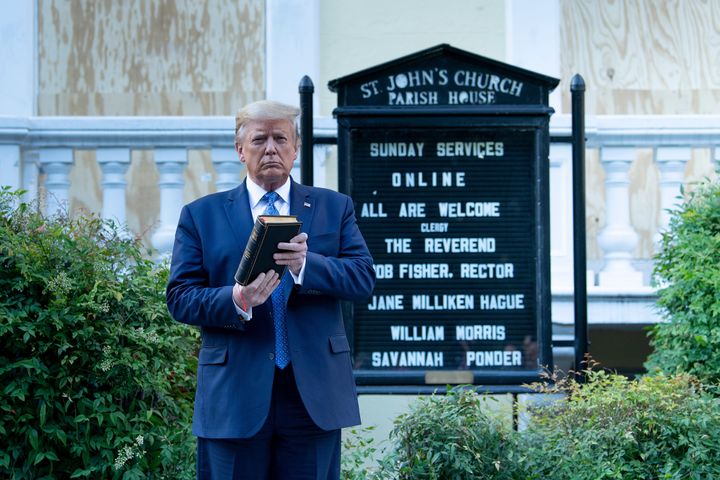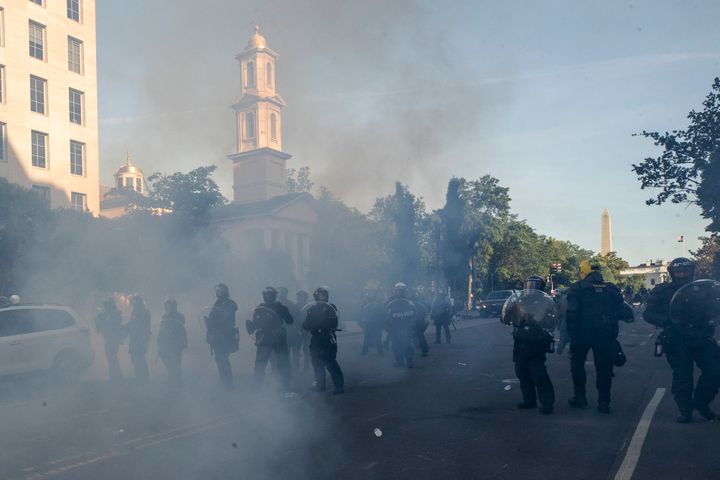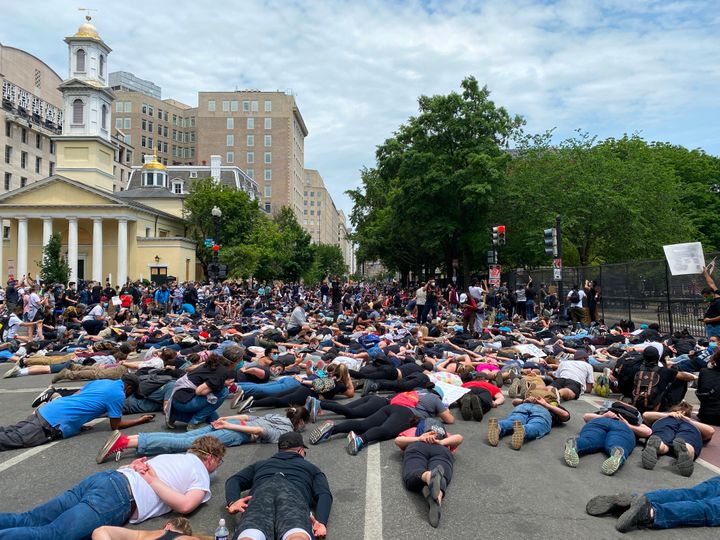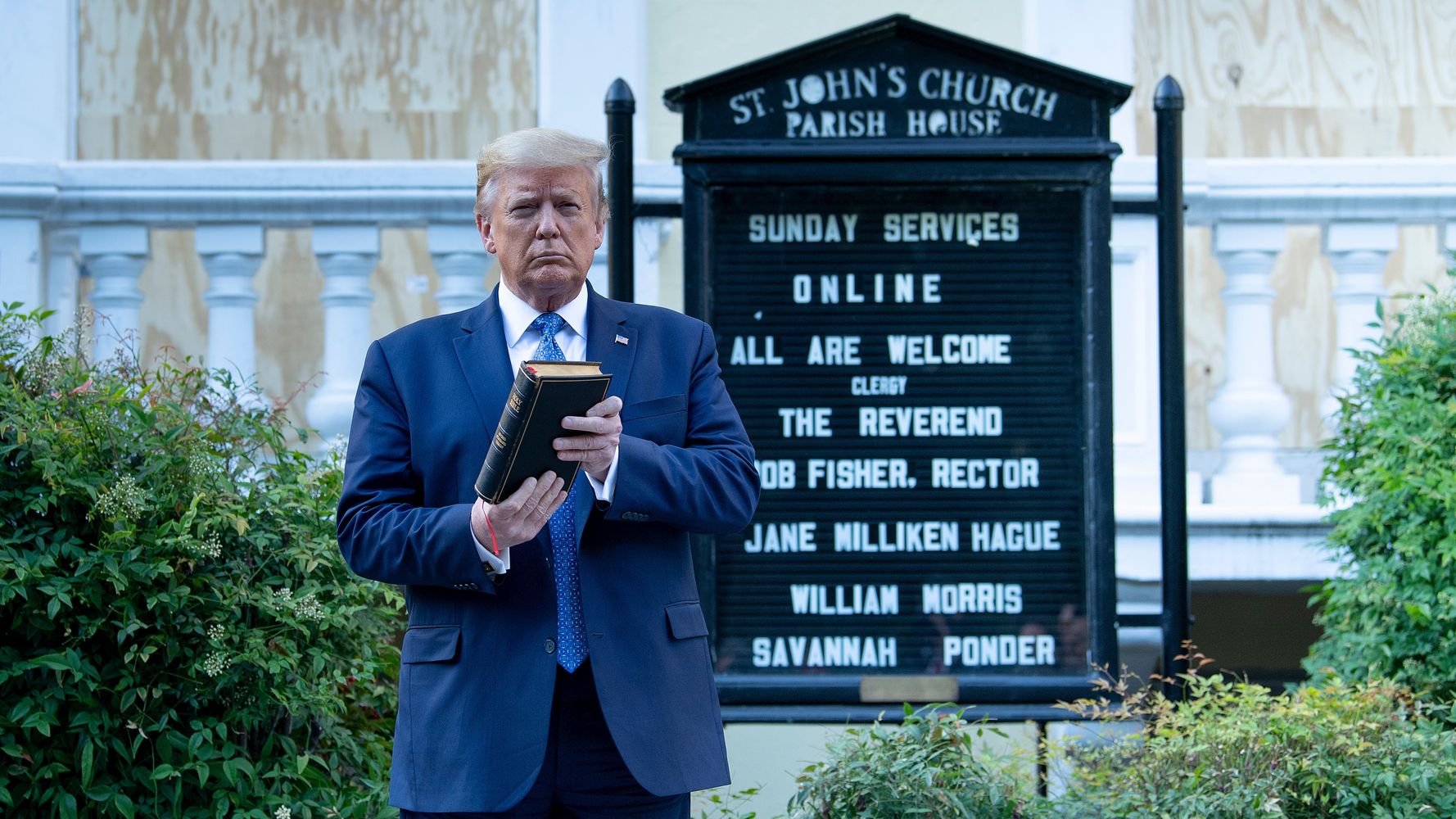[ad_1]
President Donald Trump is standing by his decision to pose with a Bible outside St. John’s Church in Washington on Monday ― a stunt that drew swift and harsh rebukes from two of the city’s top prelates.
“Most religious leaders loved it,” Trump insisted in a Fox News radio interview about a photo shoot that took place after law enforcement officers forcefully dispersed a peaceful demonstration against the police killing of George Floyd.
“I think it was very symbolic. I did hold up a Bible. I think that’s a good thing, not a bad thing, and many religious leaders loved it,” Trump told the show’s host, Fox anchor Brian Kilmeade, on Wednesday.
“Why wouldn’t they love it? I’m standing in front of a church that went through trauma ― to put it mildly,” Trump said.
Trump pointed specifically to the support he’s received from evangelist Franklin Graham and Robert Jeffress, a Dallas pastor, for posing in front of the historic Episcopal church, which was damaged during Sunday protests against police brutality toward Black Americans.
Trump also tried to distance himself from the aggressive maneuvers used by police to clear protesters from Lafayette Square, a park near St. John’s Church, to allow Trump passage to the photo op. The president insisted that officers didn’t use tear gas on the protesters, although they did, at least according to the Centers for Disease Control and Prevention’s definition of tear gas and other riot control agents.
“They didn’t use tear gas. They didn’t use ― they moved them out,” Trump said. “Now when I went, I didn’t say move them out. I didn’t know who was there.”

In a Facebook post that avoided any mention of the force used on protesters, Graham said that he was “not at all” offended by Trump’s actions. Graham said Trump demonstrated that the “burning, looting, and vandalism of the nation’s capital — including this historic house of worship—mattered, and that the lawlessness had to end.”
Graham added that he found it “unbelievable” that members of the clergy have been some of the president’s harshest critics. They “should be thanking him rather than criticizing him!” Graham wrote.
Trump said “many other people” thought his display at St. John’s was great. “It’s only the other side that didn’t like it,” Trump said. “You know, the opposing ― the opposition party, as the expression goes.”
Both the Episcopal and Roman Catholic prelates of Washington put out scorching statements opposing Trump’s photo op.
Episcopal Bishop Mariann Budde told HuffPost on Monday that although she was upset about the parish building’s being damaged, it’s much more important to focus on the systemic pattern of racism that the protesters are trying to highlight.
The Rev. Gini Gerbasi, an Episcopal priest, told HuffPost that she was in the crowd of people that was tear-gassed and driven away by police. She called what happened “grotesque and offensive and sacrilegious.”

But the president’s closest evangelical allies ― Family Research Council President Tony Perkins, Latino evangelical leader the Rev. Samuel Rodriguez, evangelical public relations consultant the Rev. Johnnie Moore ― have rallied around him.
Perkins praised Trump for “sending a message that he’s not going to be intimidated, that our government is not in hiding,” according to the Associated Press. The only thing Perkins said he would have personally done differently is to ask a multiracial group of pastors to offer a prayer for the nation.
John Fea, a historian of American evangelicalism at Messiah College, said he thinks Trump’s closest advisers are looking at his actions through the lens of Romans 13, a Bible passage that exhorts Christians to submit to authority. These verses have been cited in the past by Trump’s close evangelical allies, whom Fea has nicknamed the “court evangelicals,” to justify support for policies that appear to contradict Jesus’s teachings about compassion.

In addition, conservative evangelicals have a tendency to believe that culture war issues and the goal of winning souls through evangelism are more important than questions of social justice, Fea said.
“Court evangelicals will always place abortion, religious liberty and conservative Supreme Court justices over care and concern for the poor, the marginalized, the stranger (immigrants) and those who are the victim of systemic racism,” Fea said. “They will condemn individual acts of racism, but they do not believe in systemic or structural racism.”
More broadly, even though some rank-and-file white evangelicals are disgusted by what Trump did at St. John’s Church, that won’t change how they vote, Fea said.
“They will still vote for Trump in 2020 because he holds the right views on the social issues … that many evangelicals believe are non-negotiables when it comes to choosing a candidate,” Fea said.
Calling all HuffPost superfans!
Sign up for membership to become a founding member and help shape HuffPost’s next chapter
[ad_2]
Source link

